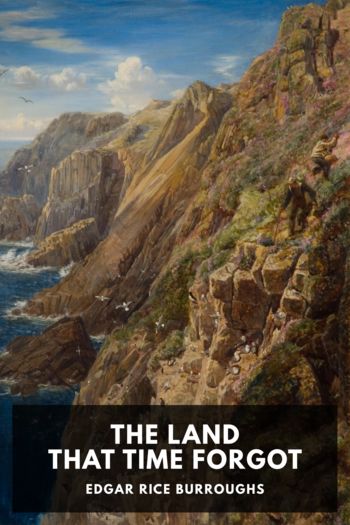South!, Ernest Shackleton [good books to read in english TXT] 📗

- Author: Ernest Shackleton
Book online «South!, Ernest Shackleton [good books to read in english TXT] 📗». Author Ernest Shackleton
The early part of the voyage down to Elephant Island in the Southern Sky was uneventful. At noon on Tuesday, May 23, we were at sea and steaming at ten knots on a southwesterly course. We made good progress, but the temperature fell very low, and the signs gave me some cause for anxiety as to the probability of encountering ice. On the third night out the sea seemed to grow silent. I looked over the side and saw a thin film of ice. The sea was freezing around us and the ice gradually grew thicker, reducing our speed to about five knots. Then lumps of old pack began to appear among the new ice. I realized that an advance through pack-ice was out of the question. The Southern Sky was a steel-built steamer, and her structure, while strong to resist the waves, would not endure the blows of masses of ice. So I took the ship north, and at daylight on Friday we got clear of the pancake-ice. We skirted westward, awaiting favourable conditions. The morning of the 28th was dull and overcast, with little wind. Again the ship’s head was turned to the southwest, but at 3 p.m. a definite line of pack showed up on the horizon. We were about 70 miles from Elephant Island, but there was no possibility of taking the steamer through the ice that barred the way. Northwest again we turned. We were directly north of the island on the following day, and I made another move south. Heavy pack formed an impenetrable barrier.
To admit failure at this stage was hard, but the facts had to be faced. The Southern Sky could not enter ice of even moderate thickness. The season was late, and we could not be sure that the ice would open for many months, though my opinion was that the pack would not become fast in that quarter even in the winter, owing to the strong winds and currents. The Southern Sky could carry coal for ten days only, and we had been out six days. We were 500 miles from the Falkland Islands and about 600 miles from South Georgia. So I determined that, since we could not wait about for an opening, I would proceed to the Falklands, get a more suitable vessel either locally or from England, and make a second attempt to reach Elephant Island from that point.
We encountered very bad weather on the way up, but in the early afternoon of May 31 we arrived at Port Stanley, where the cable provided a link with the outer world. The harbour-master came out to meet us, and after we had dropped anchor I went ashore and met the Governor, Mr. Douglas Young. He offered me his assistance at once. He telephoned to Mr. Harding, the manager of the Falkland Islands station, and I learned, to my keen regret, that no ship of the type required was available at the islands. That evening I cabled to London a message to His Majesty the King, the first account of the loss of the Endurance and the subsequent adventures of the Expedition. The next day I received the following message from the King:
“Rejoice to hear of your safe arrival in the Falkland Islands and trust your comrades on Elephant Island may soon be rescued.
“George R.I.”
The events of the days that followed our arrival at the Falkland Islands I will not attempt to describe in detail. My mind was bent upon the rescue of the party on Elephant Island at the earliest possible moment. Winter was advancing, and I was fully conscious that the lives of some of my comrades might be the price of unnecessary delay. A proposal had been made to send a relief ship from England, but she could not reach the southern seas for many weeks. In the meantime I got into communication with the Governments of the South American Republics by wireless and cable and asked if they had any suitable ship I could use for a rescue. I wanted a wooden ship capable of pushing into loose ice, with fair speed and a reasonable coal capacity. Messages of congratulation and goodwill were reaching me from all parts of the world, and the kindness of hundreds of friends in many lands was a very real comfort in a time of anxiety and stress.
The British Admiralty informed me that no suitable vessel was available in England and that no relief could be expected before October. I replied that October would be too late. Then the British Minister in Montevideo telegraphed me regarding a trawler named Instituto de Pesca No. 1, belonging to the Uruguayan Government. She was a stout little vessel, and the Government had generously offered to equip her with coal, provisions, clothing, etc., and send her across to the Falkland Islands for me to take down to Elephant Island. I accepted this offer gladly, and the trawler was in Port Stanley on June 10. We started south at once.
The weather was bad but the trawler made good progress, steaming steadily at about six knots, and in the bright, clear dawn of the third day we sighted the peaks of Elephant Island. Hope ran high; but our ancient enemy the pack was lying in wait, and within twenty miles of the island the trawler was stopped by an impenetrable barrier of ice. The pack lay in the form of a crescent, with a horn to the west of the ship stretching north. Steaming northeast, we reached another horn and saw that the pack, heavy and dense, then trended away to the east. We made an





Comments (0)